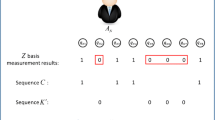Abstract
Recently, Hsueh and Chen [in Proceedings of the 14th Information Security Conference, National Taiwan University of Science and Technology, Taipei, pp. 236–242, 2004] proposed a quantum key agreement (QKA) protocol with maximally entangled states. Their protocol allows two users to negotiate a secret key in such a way that no one can predetermine the shared key alone. This study points out two security flaws in their protocol: (1) a legitimate but malicious user can fully control the shared key alone; (2) an eavesdropper can obtain the shared key without being detected. A possible solution is presented to avoid these attacks and also Tsai et al.’s CNOT attack [in Proceedings of the 20th Cryptology and Information Security Conference, National Chiao Tung University, Hsinchu, pp. 210–213, 2010] on Hsueh and Chen protocol to obtain the shared key without being detected.
Similar content being viewed by others
References
Zhou, N., Zeng, G., Xiong, J.: Quantum key agreement protocol. Electron. Lett. 40(18), 1149–1150 (2004)
Chong, S.K., Hwang, T.: Quantum key agreement protocol based on BB84. Opt. Commun. 283(6), 1192–1195 (2010)
Tsai, C.W., Chong, S.K., Hwang, T.: Comment on quantum key agreement protocol with maximally entangled states. In: Proceedings of the 20th Cryptology and Information Security Conference (CISC 2010), pp. 210–213. National Chiao Tung University, Hsinchu, Taiwan, 27–28 May (2010)
Tsai, C.W., Hwang, T.: On “quantum key agreement protocol”. Technical Report, C-S-I-E, NCKU, Taiwan, R.O.C. (2009)
Hsueh, C.C., Chen, C.Y.: Quantum key agreement protocol with maximally entangled states. In: Proceedings of the 14th Information Security Conference (ISC 2004), pp. 236–242. National Taiwan University of Science and Technology, Taipei, Taiwan, 10–11 Jun. (2004)
Bennett, C.H.: Quantum cryptography using any two nonorthogonal states. Phys. Rev. Lett. 68, 3121–3124 (1992)
Ekert, A.K.: Quantum cryptography based on Bell’s theorem. Phys. Rev. Lett. 67, 661–663 (1991)
Namiki, R., Hirono, T.: Efficient-phase-encoding protocols for continuous-variable quantum key distribution using coherent states and postselection. Phys. Rev. A 74, 032302 (2006)
Hwang, T., Lee, K.C.: EPR quantum key distribution protocols with potential 100% qubit efficiency. IET Proc. Inf. Secur. 1, 43–45 (2007)
Hwang, H., Lee, K.C., Li, C.M.: Provably secure three-party authenticated quantum key distribution protocols. IEEE Trans. Dependable Secure Comput. 4, 71–80 (2007)
Cai, Q.Y.: Eavesdropping on the two-way quantum communication protocols with invisible photons. Mod. Phys. Lett. A 351, 23–25 (2006)
Deng, F.G., Zhou, P., Li, X.H., Li, C.Y., Zhou, H.Y.: Robustness of two-way quantum communication protocols against Trojan horse attack (2005). arXiv:quant-ph/0508168
Chen, J.H., Lee, K.C., Hwang, T.: The enhancement of Zhou et al.’s quantum secret sharing protocol. Int. J. Mod. Phys. A 20(10), 1531–1535 (2009)
Shih, H.C., Lee, K.C., Hwang, T.: New efficient three-party quantum key distribution protocols. IEEE J. Sel. Top. Quantum Electron. 15(6), 1602–1609 (2009)
Chong, S.K., Luo, Y.P., Hwang, T.: On “arbitrated quantum signature of classical messages against collective amplitude damping noise”. Opt. Commun. 284(3), 893–895 (2011)
Boströem, K., Felbinger, T.: Deterministic secure direct communication using entanglement. Phys. Rev. Lett. 89(18), 187902 (2002)
Author information
Authors and Affiliations
Corresponding author
Rights and permissions
About this article
Cite this article
Chong, SK., Tsai, CW. & Hwang, T. Improvement on “Quantum Key Agreement Protocol with Maximally Entangled States”. Int J Theor Phys 50, 1793–1802 (2011). https://doi.org/10.1007/s10773-011-0691-4
Received:
Accepted:
Published:
Issue Date:
DOI: https://doi.org/10.1007/s10773-011-0691-4





